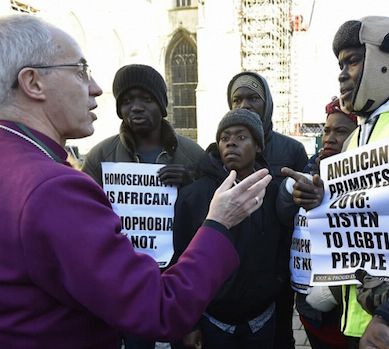The Church of England in Britain – and the rest of the world – edges closer to same sex marriage. Slowly. Alan Austin reports.
THE GLOBAL push towards accepting same sex unions was blessed this week by a vote in London by the Church of England’s peak decision-making body, the General Synod. While somewhat convoluted, the decision is a huge boost for the marriage equality movement. Not just in the Anglican community and not just in Britain.
Background to this is the determined struggle within almost all faith groups to abandon the doctrine – fiercely defended by biblical literalists and other conservatives – that all same-sex activity is an abomination. Virtually all mainstream churches, synagogues, mosques and temples are now engaged in what they call “dialogue” on the issue. In most, the shift is on towards accepting marriage equality, but with greater resistance and more acrimony in some than in others.
Following three years of internal Church of England “conversations”, a long-awaited report was presented to this week’s synod. It reaffirmed that marriage was for straight couples only and that openly gay clergy – a numerically significant and influential group – had to commit to celibacy.
In a shock to most, but to the delight of progressives, the elected governing body rejected the report. For its recommendations to be accepted, the report needed the approval of a simple majority of all three separate “houses” of the synod — the bishops, the clergy and the laity. The bishops – who authored the report – and the laity approved it. But the house of the clergy rejected it 93 to 100. Hence its failure to pass.
Given the history of reform within Anglicanism and events elsewhere in Christendom, this outcome suggests there will be no going back to blanket rejection of gay marriage — which was legalised in the United Kingdom in 2014 despite stern church disapproval.
Similar drawn-out processes have been experienced in earlier struggles against injustices, including remarrying divorcees, accepting women as priests, then as bishops, and accepting openly gay people as clergy.
In the UK parishes, numbers of openly gay priests have increased steadily over the decades. Prominent London priest Andrew Foreshew-Cain, who broke the rules when he married his same-sex partner in 2014, was popularly elected to the general synod in 2015. Bishop of Grantham, Nicholas Chamberlain, came out as gay in September.
So the move for equality is accelerating. Even the bishops’ report rejected this week contained several elements which were advances on earlier sentiments. It called for a 'fresh tone and culture of welcome and support' towards gay people. And it recommended openly gay trainees for the priesthood should not face questions about their lifestyle different from those asked of straight candidates — a sort of ecclesiastical “don’t ask, don’t tell” policy.
The next time this matter comes up at synod, it is likely the house of laity will relax its opposition to same-sex marriage. The laity’s vote on Wednesday was a fairly narrow 106 to 83 with four abstentions. Opinion polling confirms that only 17 per cent of Anglicans now believe same sex relationships are always wrong. That compares with 53 per cent in 1983.
Wednesday’s outcome is likely to hasten reform elsewhere, as the Church of England unofficially leads the global Anglican community and influences other mainstream Protestant churches. It is in formal dialogue with the Roman Catholic church and several other denominations on this and other ecclesiastical matters.
Anglican provinces now offering significant – although not unanimous – support for same-sex marriage include Canada, Brazil, New Zealand, Scotland, South India, South Africa, the USA and Wales.
Most other Protestant denominations now have active internal movements seeking to approve same-sex marriage. Churches which already do so are increasing annually. The Orthodox churches, the Jewish community, Islam and other faiths are also making slow but steady advances towards accepting gays and marriage equality.
Australia is not leading the world, but is not bringing up the rear either. Australian Marriage Equality – a collaboration which includes Christians, Jews, Muslims, Hindus, Buddhists, Quakers and others – is actively seeking to change perceptions that all religions are anti-gay.
Why does this matter? Well, much of the resistance to marriage equality in parliaments and among voters has its basis in religious teaching, notably in Africa where anti-gay attitudes are often murderous.
As Malcolm Turnbull once observed:
“Many people who oppose gay marriage do so because, generally for religious reasons, they regard homosexuality as inherently wrong — a crime in the eyes of God.”
Turnbull should know. He has several religious nutters in his joint party room who are obstructing reform in Australia.
The sooner such attitudes are abandoned, the better — for gay men and women, for the broad society to which they contribute so creatively and extensively, and for the faith communities to which they would like to belong.
You can follow Alan Austin on Twitter @AlanTheAmazing.

This work is licensed under a Creative Commons Attribution-NonCommercial-NoDerivs 3.0 Australia License
Monthly Donation
Single Donation
Don't be fooled by "fake news". Subscribe to IA for just $5.











